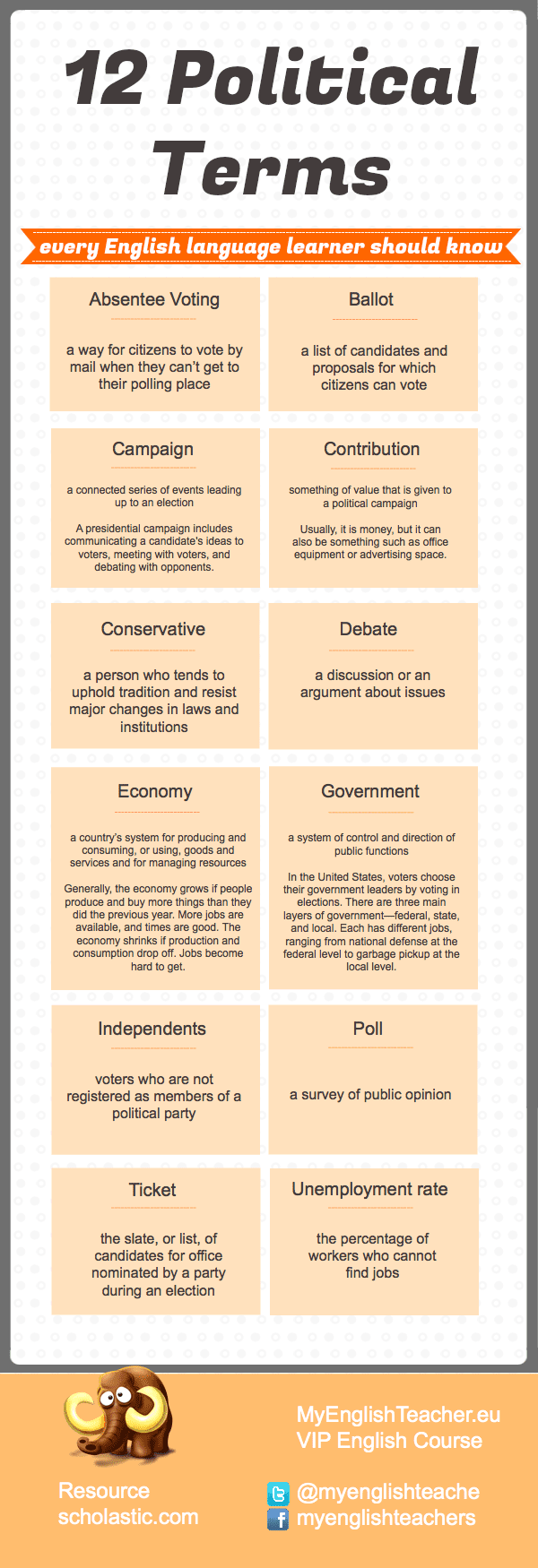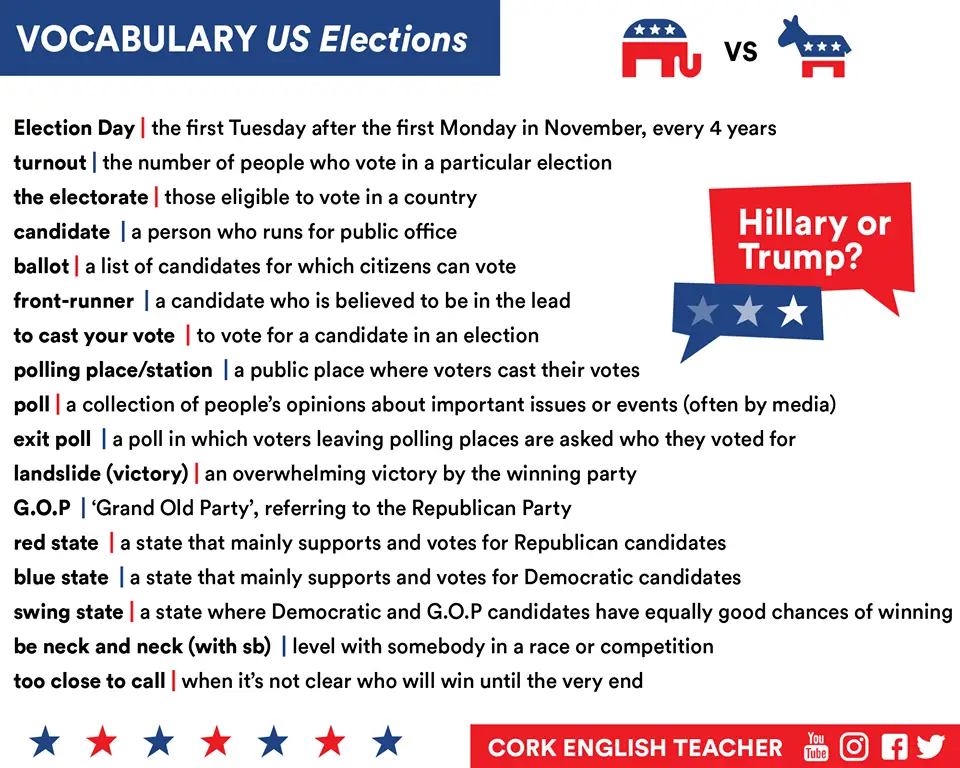Content:
PARTY POLITICS
Of all topics relating to English Vocabulary, Politics is, without doubt, the most uncompromising and difficult! The words used are so specific they cannot be changed without sounding ‘odd’ to a native Briton.
You will probably be understood but you won’t sound fluent, it will sound strange and jarring. For a non-national, even someone speaking at a high level of fluency, this is a minefield with no margin for error!
We will try to tread through this minefield together to understand the keywords and phrases. Do not deviate from them!
First I need to explain the word PARTY as it has 2 meanings.
- It is a fete or happy gathering of people.
- NOT such a happy gathering of people, rather a group of people under one name with a common way of thinking how the country should be run. This is a Political Party. Anyone can form a Party and campaign for votes, whether they end up in Parliament depends on the people!
More for you:
15 Business English Idioms and Phrases In Use – MyEnglishTeacher.eu
Looking for most commonly used business English idioms and phrases? Here you are: 15 business English expressions with meanings and examples just for you!
General Vocabulary
To run something: To be in charge of something, leader, owner.
Jarring: Incongruous, doesn’t seem to fit, seems out of place.
Dog litter: Mess left by a dog.
Plausible: Likely to happen or be true.
Abused: Taken advantage of, hurt. To abuse a position means you take more than is yours to take.
Political Vocabulary
Party: Group with similar feelings or ambitions on how the country should be run.
The Public Purse: Money collected by government in the form of taxes.
Electorate: The public who voted for someone
Constituents: The people who live in a constituency
Constituency: Areas of the UK. One person represents a Constituency in Parliament. For example: Brighton West, or South Kensington North.
Candidates: People who put themselves forward to be voted for in an Election.
Campaign: The organised process of trying to persuade people to vote for you.
Votes: A secret process of one person choosing someone to represent them in Parliament.
To be elected/To get elected: To be the Candidate with the most votes!
Polling station: The local hall or office where people go to vote.
Term of office: The period of time a Government is in power.
Prime Minister: The leader of the ruling Party.
Deputy Prime Minister: The assistant to the Prime Minister and the person who takes control in the absence of the Prime Minister.
Shadow Prime Minister: The leader of the Party in Opposition (second best party!)
Shadow Minister: A minister in opposition to the elected party.
Minister: A person in government (ruling Party) who is in charge of a Department. eg. Foreign Office, the Minister of this department is called the ‘Foreign Secretary’
Junior Minister: An assistant in the leadership of a Department.
Cabinet: The core leadership of the ruling party. 12 people, each one is head of a major Department, therefore they are all Ministers. All decisions by the Prime Minister have to be agreed by Cabinet.
Cabinet Minister: A person belonging to the cabinet
Junior Cabinet Minister: An assistant to Cabinet Minister.
MP: Member of Parliament
MEP: Member of European Parliament
THE PARTY
In Britain we have 3 main Parties.
One is IN POWER (currently elected and running things), the next is called the
SHADOW PARTY (the next most popular party when voting took place and they are
IN OPPOSITION to the ruling Party in parliament), plus a third Party. There are plenty more but most attention is given to the top 3.
There was Party called the Monster Raving Loony Party, a Party that wore funny clothes and didn’t take themselves seriously, they won surprise elections and ended up in Parliament!
We need a few more definitions before we move on.
Read more:
Useful English Phrases For Running A Business Meeting
Business English phrases for meetings. Meetings play a very big part in the business world. During meetings, important decisions are made, people are promoted, demoted, hired or even fired! The future of companies is predicted, business tactics are analysed, competitors are targeted and strategies are planned.
GOVERNMENT
The group of people who control the laws and affairs of the country. This includes all voted representatives in Parliament PLUS all the departments, and people in those departments, working for the government. For example, The Foreign Office or The Foreign Office or The Department of the Environment.
These departments belong to the CIVIL SERVICE (still government!) whilst the people working in them are CIVIL SERVANTS. They are STILL the Government! MI5 is a Civil Service whilst some of the James Bond characters such as Q, M and Moneypenny would be Civil Servants. All of them could say they were working FOR the Government or that they were IN Government.
PARLIAMENT
All those involved in MAKING laws. The Queen (as head of Parliament, although her role is mainly symbolic), the HOUSE OF LORDS, and the HOUSE OF COMMONS, are part of Parliament. NOT the Departments and the Civil Service.
ELECTION VOCABULARY
So how do we ELECT our Government in Britain?
The Prime Minister of the UK David Cameron has CALLED a General Election: The UK is currently HOLDING an Election. (The man CALLS it, the country HOLDS it!)
We’re now ready to start!
The Queen gets the ball rolling when she DISSOLVES the current parliament (she doesn’t stop it, cease it, remove it or cancel it, she dissolves it!) and the Prime Minister CALLS a General Election, (he doesn’t start it, begin it, initiate it or create it, he CALLS an election).
All very specific terminology and phrasing. However, just to make things complicated, the country HOLDS an election! The word HOLD is also used for organising a big event, similar to ‘hosting‘. You might ‘HOLD a party in her honour’, or ‘HOLD a service in his memory’.
For this brief time, now, Britain has no government. An alarming thought, although in the case of a national emergency, Parliament would BE RECALLED. A General Election is held once every 5 years to let the people choose who they want to govern them. A date is set and the
A date is set and the campaigning begins. Each PARTY sets out its ‘MANIFESTO’, which is effectively a list of things they promise to do if they are voted for and GET INTO POWER. The job of ‘campaigning’ is to try to persuade people to vote for you or your Party. So far so good!
The MANIFESTO is a controversial subject in Britain. Any Party can write anything in their Manifestos. They could promise or ‘pledge’ to eradicate dog litter from the streets, or promise to pay all poor families more money. However, they don’t have to say HOW they would do this. It is up to the general public to assess whether they think that Party will stick to their Manifesto or not, very tricky!
Read more:
7 Simple Examples of Business Email Writing in English
Most of us in the business world use emails as the main, and in some cases the only, means of written communication. For many students studying Business English and practising their business email writing skills is an important part of their course.
If they do say how they will do it and it sounds plausible they are more likely to be voted for. But, as if that’s not bad enough, once in power, they are under NO obligation to stick to it at all! In other words, once voted in they don’t have to carry out ANY of it!
A common exercise in schools is to debate and then write their own Manifestos, trying to think what obstacles might arise or who might try to stop you. It’s an interesting exercise and surprisingly hard!
OK, the Parties are now ready to LAUNCH their campaigns, time is ticking on. This is usually a good moment to go away on holiday! Television, radio, Current Affairs and News Programs are flooded with election news. Election fever! Fortunately, in Britain, this process doesn’t go on for too long.
- The word LAUNCH is interesting, it is usually used to describe the first time a ship enters the sea, but is also used when a big project or campaign is started. You wouldn’t launch a meeting but you might launch an anti-smoking campaign. The anti-smoking campaign is bigger and more significant. You LAUNCH something big.
- Meanwhile, a CAMPAIGN is the work you put in trying to persuade people to think like you or trust your views. Campaigns happen outside politics too, perhaps the most famous one in Britain was the ‘Anti-Hunting Campaign’. You have teams of people employed here, CampaignLeaders, Campaign Organisers, Campaign Strategists.
The United Kingdom, meanwhile, is divided into small regions. During an election, however, they are called CONSTITUENCIES. This is the area represented by one person (voted for in the election) in Parliament. In other words, this elected person should do everything they can to take the problems and queries of the people in the constituency to Parliament to be discussed and hopefully changed. A voted Member of Parliament REPRESENTS the people in their constituency.
Read more:
A Practical Guide to Using Diplomatic English in a Business Environment
If you’ve ever found yourself in a situation where you have to tell your boss or a client some bad news, then you’ll know just how important it is to be able to use diplomatic English. Choosing the right words and the right grammar can go a long way to removing some of the unpleasantness of the message we have to deliver.
Now, this is the really important part!
MPs are PUBLIC SERVANTS! Elected Members of Parliament are paid to serve the public. When there are scandals in the news involving MPs, the people in the area they represent (the constituents) feel let down and betrayed. We vote for them, they are given a salary from public taxes and we expect them to behave in a certain way.
This is an ENORMOUS responsibility. Sadly, it doesn’t always work as we would hope. Ongoing work within Parliament is trying to ensure that a position in government is not abused, but it is a difficult one.
The people who live in these CONSTITUENCIES are called CONSTITUENTS and a person wanting to be voted for to represent them in Parliament are called CANDIDATES. You vote for a local CANDIDATE. This is hard, so here is a phrase to help. The CANDIDATE hopes to work for the CONSTITUENTS in their CONSTITUENCY!
- CANDIDATE = Person
- CONSTITUENT = Person
- ELECTORATE = Person
- CONSTITUENCY = Place
VOTING
Now we’re getting close to the big day. The local candidates and the Party Leaders have put forward their MANIFESTOS, the debates are finished. The people are ready to vote. Every resident in the UK or British National is entitled to vote, but in order to do so you need to be on the ‘Electoral Register’. This usually happens automatically when you pay taxes in the UK.
Read more:
Formal and Informal Email Phrases Starting with Greetings
Whether you’re writing to friends, colleagues or to a potential business partner, your main goal is to get your message across, in other words, to ensure the recipient understands you. If you use improper or incorrect language and continuously make mistakes in your e-mail, not only might you fail to make yourself understood, you might also fail to make a good impression on the reader.
The day arrives and local vilage halls or sometimes school rooms are turned into POLLING STATIONS. This is where you go to CAST YOUR VOTE! Polling stations will all close at the same agreed time where upon teams of people begin the count. By dawn the next day all votes are counted, The United Kingdom of Great Britain and Northern Ireland wakes up to begin another 5 years of a democratically elected Government, here’s hoping it was the Party you wanted!
Phrases used specifically in politics
- To cast your vote
- To launch a campaign
- To enter politics
- To hold a General election
- To hold a referendum
- To hold an election
- To win an election
- To win a campaign
Read more:
Polite Expressions in English: Words, Phrases and Questions to be Kind
In our first blog post on diplomatic / polite expressions in English – A Practical Guide to Diplomatic English in a Business Environment , we looked at several techniques for softening the message (I’m afraid, so sorry, to be honest, unfortunately, with all respect ) or the tone of our language in English.
About the author:
Lindsay Dinan is originally from the South West of England between Dartmoor and the sea. She now lives with her family in Western France. She has worked as an illustrator for a number of years also living on the Côte d’Azur, but now concentrates more fully on teaching English as a foreign language and writing articles on a regular basis for AnglaisPoitiers.













![Names of Generations, Years and their Characteristics [Generations Timeline] Names of Generations and years: The Greatest Gen, Baby Boomers, Gen X, Y, Z](https://www.myenglishteacher.eu/blog/wp-content/uploads/2020/06/Names-of-Generations-218x150.png)
















in personal life, if any one make politics,,, that is business life. There is no value’s.